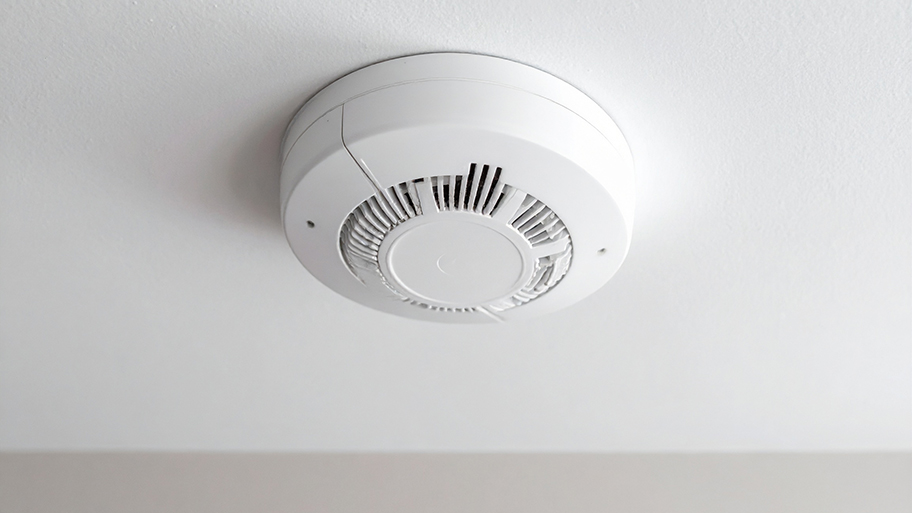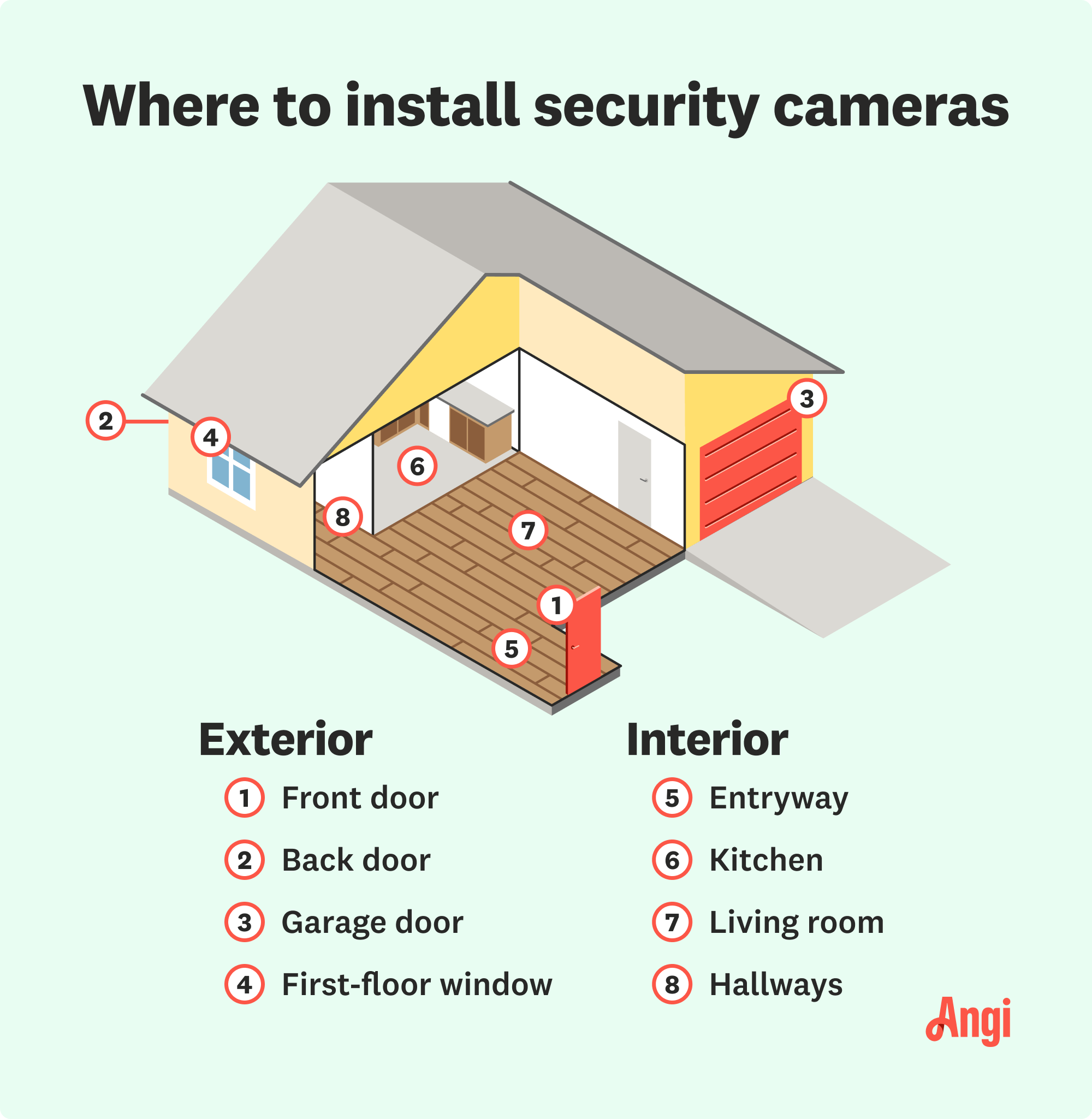
Discover how much smoke detector installation costs. Understand your out-of-pocket expenses so you can protect your family and home.
Installing a security camera system costs an average of $1,296. Systems start at $125, but more extensive camera setups cost $3,500 or more.


The size of the security system you install and the features you want are the most important cost factors to consider.
Wired cameras cost four to six times as much as wireless ones but are more convenient and don’t require charging.
A self-monitored system can save $500 to $1,000 per year in professional monitoring costs, but it offers less protection and peace of mind.
Most homeowners insurance companies offer discounts on premiums when you install a professionally monitored security system.
These days, cameras are a must-have for most homeowners. They help keep an eye on your property whether you’re at home or on the road and provide extra peace of mind. On average, security camera installation costs $1,296, though it ranges between $592 and $2,040. The following cost breakdown will assist you with budgeting for a new security camera system for your home.
The cost of a security camera system is affected by three main factors: the number of cameras needed, the quality of the cameras purchased, and whether you have them installed professionally or do it yourself.
The type of security cameras you decide on will greatly impact your installation costs. Here are a few of your options.
The first choice to make when purchasing a security camera comes down to standalone cameras versus going all-in on a whole-home security system with cameras included.
Whole-home security systems include cameras offering strategic vantage points along with an alarm system. The cost of a whole-home security system can range from $208 to $1,090.
Systems commonly include cameras as well as window and door sensors and automated alarms. Today's wireless home security systems link to your devices to give you a real-time view of who is arriving at your home. You’ll know exactly when the package from your latest online shopping spree arrives.
A security camera is a more budget-friendly option that allows you to strategically place a camera in a high-vulnerability spot. This option can be a smart pick if you want to increase security at your home on a budget.
CCTV, short for closed-circuit television, uses coaxial wires and is designed for real-time monitoring. The footage is sent to a specific monitor or recorder, while surveillance cameras connect via Power over Ethernet (POE) and can send data to the cloud. It’s harder to back up video with CCTV because it’s not connected to the internet, but they’re less likely to be hacked like a Wi-Fi security camera.
CCTV isn’t a common choice among homeowners and the cameras have a lower resolution. It’s mostly used in commercial spaces like malls because it requires someone to actively keep an eye on what’s going on.
In comparison, surveillance cameras have excellent resolution, with some models offering 4K and ultra-wide angles so you can pick up the smallest details. Since data is easily stored on the cloud and you can set the camera to record when the motion detectors go off, these cameras are more popular with homeowners.
You can expect to pay $600 to $1,600 for a CCTV system with four cameras, while surveillance cameras cost $500 to $1,500 for four cameras.
Practice password safety with your Wi-Fi network. Changing your password regularly can help prevent hackers from accessing your security devices.
The most affordable cameras are wireless ones, which cost $25 to $35 per camera. You can get sophisticated cameras with more options for $250 or more. The higher-end cameras have features like integrated spotlights, noise-canceling audio, color night vision, and apps that integrate with emergency services.
But if you’re looking for a more secure system with no chance of going offline due to Wi-Fi connectivity issues, you’ll want a wired camera. These cost $150 to $500 or more each.
The features of wireless and wired cameras are fairly similar, but the difference is that wired cameras can connect to analog DVRs for recording footage. Wired cameras on the higher end of the price range have a better resolution of 3 megapixels or more and can offer more sophisticated night vision. However, if you want the best resolution, wireless cameras are a better bet.

The biggest factor affecting cost is the number of cameras you need. Since each camera costs between $100 and $200 to install, you will have to add that amount to your budget, in addition to the cost of the camera itself.
| Number of Cameras | Cost |
|---|---|
| 1 | $100–$200 |
| 2 | $200–$400 |
| 4 | $400–$800 |
| 6 | $600–$1,200 |
If your home is particularly large or you just want to cover every possible angle around your home, you'll need more than the average four to five cameras in a security camera system.
There are many different cameras to choose from, each with its own advantages, disadvantages, and price tag. Some cameras may cost close to $100 each, while others may be as little as $20 apiece.
Here are the most common features you’ll find in most wired and wireless cameras, regardless of price:
Night vision
Two-way speaker
Remote monitoring
Motion detection
High-definition video
Data storage
Built-in spotlight
Facial recognition
When choosing a camera for your home, consider what’s most important to you. For example, if your biggest concern is keeping footage secure, opt for a system that offers data storage on a local hard drive. Others may want to know who’s coming and going, so a system with facial recognition will be the priority.
Another essential feature to consider is the camera quality. While higher-quality cameras come at a price, sometimes being able to pick up the smallest of details is a significant benefit when reviewing past footage.
Entry-level cameras tend to have 1080p resolution, while mid-range ones have 2K resolution and colored night vision. Many high-end cameras have 2K to 4K resolution with wider viewing angles. Also, the more expensive systems offer better night vision thanks to infrared LEDs and technology that deliver crisp images.
Installation accounts for 50% to 70% of the budget for installing a security camera system. On average, labor for wired systems ranges between $80 and $200 per camera.
Depending on your needs, you can DIY your wireless camera installation. These cameras are easier to set up than wired ones and only require basic tools. However, pros do more than just install cameras. A local security camera company will also determine which areas are the most important to monitor, set up a hard drive and video monitor for you, and make sure everything is working properly.
When installing a surveillance camera system, consider other essential items you’ll need to run it efficiently. Don’t forget to add these additional costs to your budget when purchasing security cameras.
| Add-on | Average Cost |
|---|---|
| Video monitor | $50–$200 |
| Hard drive storage for the footage | $50–$100 |
| Cables | $15–$30 |
| Surveillance system software | $50–$100 |

Installing your own security cameras may cost up to $200 per camera. However, you can buy both wired and wireless cameras online for as little as $20 and $50 each on average. That means for each camera; you could save up to $150, or about $600 to $750 for a standard system.
And installing security cameras is absolutely a project you can do yourself. As long as you know how to set up a hard drive and video monitor and hook everything up to each other, there’s no reason why you can’t set up your own home security system.
However, if you encounter technical difficulties or just want security professionals to help you understand how to best cover your home with cameras for maximum visibility, it may be a good idea to reach out to a pro. At the very least, look for a security camera company in your area, get a consultation and a quote, and then consider your options.
Tightening up your home’s security goes beyond cameras. For added peace of mind, consider including other home security upgrades such as motion sensors, gates, and smart locks.
Motion Sensors: Motion sensors detect unexpected movement and can trigger immediate alerts or alarms. Use them to secure entry points and high-traffic areas.
Security Gates: Security gates provide a physical barrier for driveways and entrances. Many models are motorized and integrate with home automation systems.
Smart Locks: Smart locks provide remote access and control over your door locks via smartphone apps. They eliminate the risk of losing your keys and offer detailed access logs.
Doorbell Cameras: Doorbell cameras allow real-time monitoring of front-door activity. With motion detection alerts and two-way communication, you can interact with visitors and deter potential threats.
Glass Break Sensors: These sensors detect the sound of breaking glass and are useful in homes with large glass doors or many windows.
Security Lighting: Security lighting illuminates dark areas around the home, and can be set on timers and/or motion-activated.
Window and Door Sensors: These sensors monitor potential entry points and alert homeowners to unauthorized openings
Panic Buttons: Panic buttons offer immediate contact with security services during emergencies. Place them in strategic and easily accessible locations throughout your home to ensure quick access if the need arises.
Surveillance Drones: Surveillance drones provide aerial views of large properties, ideal for perimeter patrols.
Home is the most important place on earth, which is why Angi has helped more than 150 million homeowners transform their houses into homes they adore. To help homeowners with their next project, Angi provides readers with the most accurate cost data and upholds strict editorial standards. We’ve surveyed thousands of real Angi customers about their project costs to develop the pricing data you see, so you can make the best decisions for you and your home. We pair this data with research from reputable sources, including the U.S. Bureau of Labor Statistics, academic journals, market studies, and interviews with industry experts—all to ensure our prices reflect real-world projects.
Want to help us improve our cost data? Send us a recent project quote to [email protected]. Quotes and personal information will not be shared publicly.
From average costs to expert advice, get all the answers you need to get your job done.

Discover how much smoke detector installation costs. Understand your out-of-pocket expenses so you can protect your family and home.

From warding off intruders to protecting from falls, bars on windows can make a home much more secure. Here’s how much it costs to install bars on windows.

How much does it cost to install a doorbell camera? It depends on whether you plan to DIY or hire a pro. Learn about different models and their power sources, too.

Do security system signs really deter burglars? They might help, but fake security signs can get you in some legal trouble. Find out how to best use security signs and other top security measures to help prevent a burglary.

Thinking about upgrading your home security? Learn how a security system can make you feel safe and lower your home insurance rates.

Stay warm and safe with these 9 essential space heater safety tips to prevent fires, protect kids or pets, and keep your home cozy all winter long.